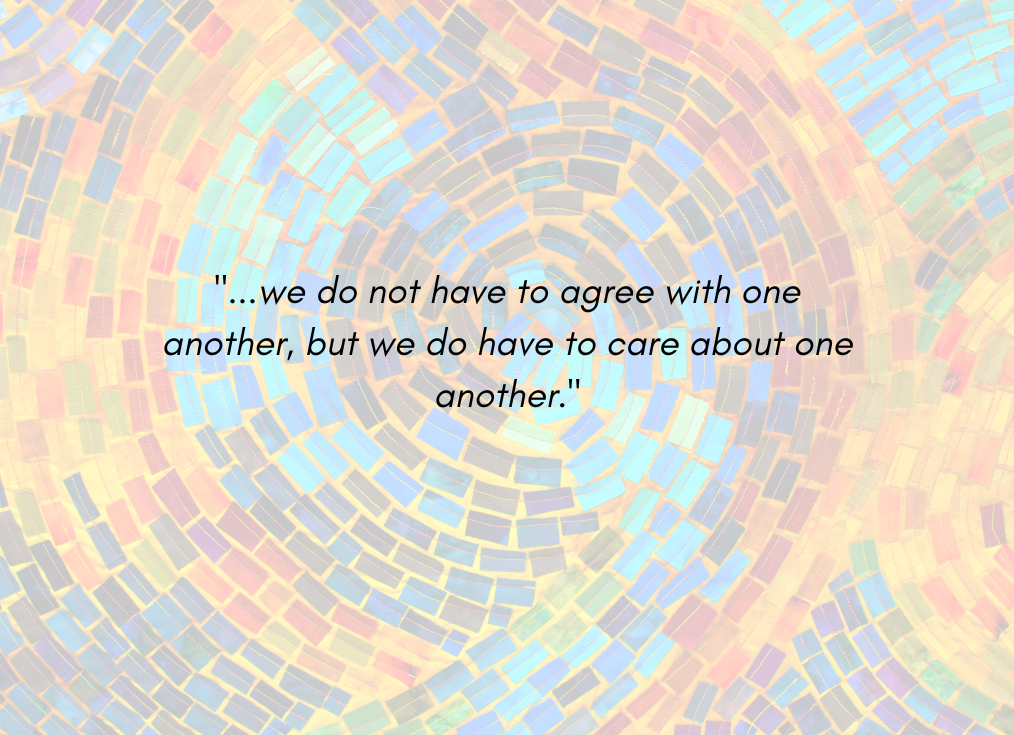A Fabric of Ideologies

November 4, 2022 / 10 Cheshvan 5783
“Let there be no conflict between you and me.” (Genesis 13:8)
These are the words of our patriarch Abram to his nephew Lot as they were about to settle in Gd’s Promised Land, the land of Canaan.
Disagreements and differences of opinion, in fact, even heated arguments and passionate debate, have been a fundamental tenet of the Jewish people’s history since our inception. Indeed, (spoiler alert) in the opening of next week’s Torah portion, Abraham (having now received his honorific name change) engages in what is recognized as the most personally argumentative interaction with Gd by anyone in the Torah.
In the Ethics of our Fathers, Pirke Avot 5:17, we read that, “Every dispute that is for the sake of Heaven, will endure. But any [dispute] not for the sake of Heaven, will never endure.” For instance, the well-known debates between our great sages Hillel and Shammai, who vehemently disagreed on some issues, never deteriorated into personal attacks. Their arguments always stayed at the level of the great rabbis’ positions, and never questioned their personhood. On the other hand, Korach’s personal attack on Moses, in Numbers Chapter 16, is used to illustrate an example of a dispute not for the sake of Heaven.
I returned this week from the Jewish Federations of North America General Assembly. An extraordinary gathering of over 1200 Jewish professionals and lay leaders to discuss the current challenges and opportunities facing our collective Jewish community across North America. One significant concern raised in the collective, as well as the many breakout sessions throughout the three-day gathering, was the polarization of our local Jewish communities.
It does not matter how we got here, other than to learn from the journey so as to avoid circling back in the future. What is important today is how we come back to the proverbial community table and start by simply agreeing to disagree. Or, to paraphrase the great Lord Rabbi Jonathan Sacks z”l, we do not have to agree with one another, but we do have to care about one another.
As the Jewish Federation of San Antonio, our driving mandate is to build a sustainable community for generations to come. Our place is not to decide if one Jewish ideology is more correct than another, rather it is to acknowledge that we are made up of a fabric that weaves many ideologies that have developed over generations and across the broad spectrum of Jewish life from right to left, young to aged, new to old, and so on.
Rabbi Yaffa Epstein, Director of the Wexner Heritage Program, elaborated on the great Maimonides’ position on the beginning of the Mishna, “which asserts that a person must study her tradition diligently to be able to distinguish between Torah and heresy, and he [Maimonides] argues that we are obligated to study and deeply engage with ideas that are counter to our own beliefs. Rabbi Yitz Greenberg teaches that this Mishna is an argument for reasoned faith: ‘One should teach students by intelligently refuting the wrong views rather than by training them to close their minds and reject wrong views out of conformity, obedience to authoritarian instruction, or ignorance and stereotype.’”
Epstein further explains that “The Mishna [warns] us against the dangers of deepening our echo chambers by engaging only with those people who believe what we believe. Instead, we must equip our followers with complexity, nuance, strength, and the capacity to engage in rigorous debate.”
The fact is that when we return to this week’s Torah portion, and we read the verses after Abram’s plea to Lot to avert conflict between their families, Lot heads east to the Jordan Valley and Abram remains on the lands to the West. BUT the story does not end there. Sure, we could say that the disagreement led to the earliest forms of “cancel culture,” where each family departed to live their own lives separate from one another. However, the story actually ends when danger arises in Sodom and Gomorrah (the lands where Lot settled) and where Abram has to go in and save his nephew’s family. Because that’s what family does. No matter the disagreement. No matter the difference of opinion. No matter the conflict. We are bound to support one another forever because we are…
Shabbat Shalom,

